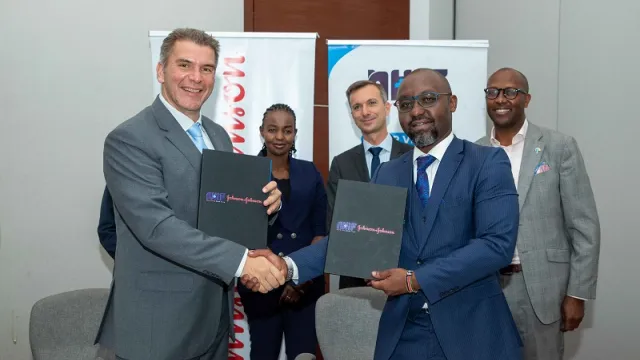NHIF, Janssen Kenya ink a deal to enhance access to prostate cancer drugs

NHIF, Janssen Kenya ink a deal to enhance access to prostate cancer drugs
Patients covered by the National Health Insurance Fund (NHIF) can now access the prescription drug, Abiraterone Acetate, used for the treatment of advanced prostate cancer.
The NHIF and Johnson & Johnson Middle East FZ-LLC (Janssen Kenya) have entered an agreement that will ensure the drug is available to NHIF members within their existing package.
Abiraterone Acetate is manufactured and distributed by Janssen Kenya, one of the pharmaceutical companies of Johnson & Johnson, and will be part of strategic development to expand access to quality treatment regimes in Kenya.
Principal Secretary at the Ministry of Health Susan Mochache described the partnership as a landmark development that will help boost the local access to innovator drugs adding that the Ministry and NHIF have been engaging pharmaceutical companies to seal similar private-public partnership agreements that will facilitate access to innovator drugs at affordable rates.
“The Ministry of Health and NHIF has sealed this landmark MoU with Janssen as part of our ongoing foundation building to ensure the success of the Universal Health Coverage (UHC) national rollout. We are proud to be associated with Janssen for taking the lead in opening up access to an innovator drug such as Abiraterone Acetate, which will enhance positive health outcomes for prostate cancer patients,” Ms Mochache said.
Senior Vice President for Emerging Markets at Janssen Pharmaceutical Companies of Johnson & Johnson Mr Asgar Rangoonwala reiterated the company´s commitment to boosting access to innovative medicines in emerging economies.
The company, he said, is pursuing public-private partnerships to enhance access to safe, effective medicines and vaccines in developing countries for the most vulnerable patients.
“At Janssen, we are committed to advancing medical innovations that address unmet health needs in resource-limited settings. The MoU signed with NHIF is one of our partnerships to rollout new access models and equitable pricing strategies that improve the availability of our medicines to patients in emerging countries such as Kenya,” he said.
Read also: Germany firms in Kenya bullish about trade prospects in the coming months
NHIF CEO, Dr Peter Kamunyo, confirmed that NHIF has reviewed and expanded the range of benefits available for cancer patient, saying the review of benefits is geared towards alleviating the plight of cancer patients and increase access to medication.
“The fund’s core mandate is to provide medical insurance cover to all its members by ensuring that the range of benefits remains value-filled. The spirit of UHC is to ensure access to quality and consistent healthcare services needed by all Kenyans without having to be impoverished because of the high medical bills. We are negotiating for such innovations so that the cost of medication required to save lives fits within the packages offered,” Dr Kamunyo said.
Similarly, AMREF Health Africa Group CEO Dr Githinji Gitahi lauded the partnership noting that it will help alleviate the plight of patients undergoing cancer treatment.
While reiterating the need for a functional cancer registry to guide response strategies, Dr Gitahi also highlighted the need for patient-centered approaches to healthcare delivery.
Currently, the NHIF cancer care package entails up to ten chemotherapy sessions, oral and injectable anti-cancer drugs, inpatient, and outpatient oncology services, 20 sessions for radiotherapy, and up to two sessions for Brachytherapy for advanced cancer, per year.
The health facilities that offer the package include some level five and six hospitals and selected private hospitals in urban centers.
On the other hand, NHIF covers six sessions for the first-line treatment for up to Kes25,000 per session, four sessions for second-and third-line treatment for up to Kes150,000 per session, and 20 sessions of radiotherapy at Kes3,600 per session.
At the diagnosis level, the cover includes a biopsy under the surgical package in addition to radiology including MRIs, ultrasounds, or CT and PET scans.
According to the Ministry of Health statistics, cancer remains one of the major non-communicable diseases in Kenya and ranks third as a cause of death after infectious diseases and cardiovascular diseases. It is estimated that there are 42,000 new cases annually and approximately 28,000 cancer-related deaths every year.



